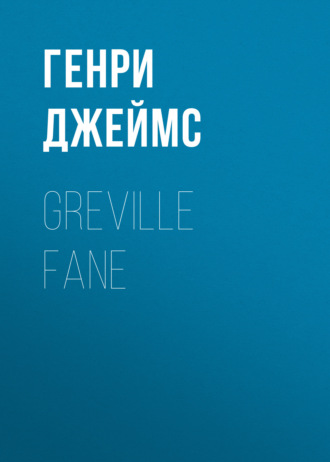
Генри Джеймс
Greville Fane
An industrious widow, devoted to her daily stint, to meeting the butcher and baker and making a home for her son and daughter, from the moment she took her pen in her hand she became a creature of passion. She thought the English novel deplorably wanting in that element, and the task she had cut out for herself was to supply the deficiency. Passion in high life was the general formula of this work, for her imagination was at home only in the most exalted circles. She adored, in truth, the aristocracy, and they constituted for her the romance of the world or, what is more to the point, the prime material of fiction. Their beauty and luxury, their loves and revenges, their temptations and surrenders, their immoralities and diamonds were as familiar to her as the blots on her writing-table. She was not a belated producer of the old fashionable novel, she had a cleverness and a modernness of her own, she had freshened up the fly-blown tinsel. She turned off plots by the hundred and—so far as her flying quill could convey her—was perpetually going abroad. Her types, her illustrations, her tone were nothing if not cosmopolitan. She recognised nothing less provincial than European society, and her fine folk knew each other and made love to each other from Doncaster to Bucharest. She had an idea that she resembled Balzac, and her favourite historical characters were Lucien de Rubempré and the Vidame de Pamiers. I must add that when I once asked her who the latter personage was she was unable to tell me. She was very brave and healthy and cheerful, very abundant and innocent and wicked. She was clever and vulgar and snobbish, and never so intensely British as when she was particularly foreign.
This combination of qualities had brought her early success, and I remember having heard with wonder and envy of what she “got,” in those days, for a novel. The revelation gave me a pang: it was such a proof that, practising a totally different style, I should never make my fortune. And yet when, as I knew her better she told me her real tariff and I saw how rumour had quadrupled it, I liked her enough to be sorry. After a while I discovered too that if she got less it was not that I was to get any more. My failure never had what Mrs. Stormer would have called the banality of being relative—it was always admirably absolute. She lived at ease however in those days—ease is exactly the word, though she produced three novels a year. She scorned me when I spoke of difficulty—it was the only thing that made her angry. If I hinted that a work of art required a tremendous licking into shape she thought it a pretension and a pose. She never recognised the “torment of form”; the furthest she went was to introduce into one of her books (in satire her hand was heavy) a young poet who was always talking about it. I couldn’t quite understand her irritation on this score, for she had nothing at stake in the matter. She had a shrewd perception that form, in prose at least, never recommended any one to the public we were condemned to address, and therefore she lost nothing (putting her private humiliation aside) by not having any. She made no pretence of producing works of art, but had comfortable tea-drinking hours in which she freely confessed herself a common pastrycook, dealing in such tarts and puddings as would bring customers to the shop. She put in plenty of sugar and of cochineal, or whatever it is that gives these articles a rich and attractive colour. She had a serene superiority to observation and opportunity which constituted an inexpugnable strength and would enable her to go on indefinitely. It is only real success that wanes, it is only solid things that melt. Greville Fane’s ignorance of life was a resource still more unfailing than the most approved receipt. On her saying once that the day would come when she should have written herself out I answered: “Ah, you look into fairyland, and the fairies love you, and they never change. Fairyland is always there; it always was from the beginning of time, and it always will be to the end. They’ve given you the key and you can always open the door. With me it’s different; I try, in my clumsy way, to be in some direct relation to life.” “Oh, bother your direct relation to life!” she used to reply, for she was always annoyed by the phrase—which would not in the least prevent her from using it when she wished to try for style. With no more prejudices than an old sausage-mill, she would give forth again with patient punctuality any poor verbal scrap that had been dropped into her. I cheered her with saying that the dark day, at the end, would be for the like of me; inasmuch as, going in our small way by experience and observation, we depended not on a revelation, but on a little tiresome process. Observation depended on opportunity, and where should we be when opportunity failed?
One day she told me that as the novelist’s life was so delightful and during the good years at least such a comfortable support (she had these staggering optimisms) she meant to train up her boy to follow it. She took the ingenious view that it was a profession like another and that therefore everything was to be gained by beginning young and serving an apprenticeship. Moreover the education would be less expensive than any other special course, inasmuch as she could administer it herself. She didn’t profess to keep a school, but she could at least teach her own child. It was not that she was so very clever, but (she confessed to me as if she were afraid I would laugh at her) that he was. I didn’t laugh at her for that, for I thought the boy sharp—I had seen him at sundry times. He was well grown and good-looking and unabashed, and both he and his sister made me wonder about their defunct papa, concerning whom the little I knew was that he had been a clergyman. I explained them to myself by suppositions and imputations possibly unjust to the departed; so little were they—superficially at least—the children of their mother. There used to be, on an easel in her drawing-room, an enlarged photograph of her husband, done by some horrible posthumous “process” and draped, as to its florid frame, with a silken scarf, which testified to the candour of Greville Fane’s bad taste. It made him look like an unsuccessful tragedian; but it was not a thing to trust. He may have been a successful comedian. Of the two children the girl was the elder, and struck me in all her younger years as singularly colourless. She was only very long, like an undecipherable letter. It was not till Mrs. Stormer came back from a protracted residence abroad that Ethel (which was this young lady’s name) began to produce the effect, which was afterwards remarkable in her, of a certain kind of high resolution. She made one apprehend that she meant to do something for herself. She was long-necked and near-sighted and striking, and I thought I had never seen sweet seventeen in a form so hard and high and dry. She was cold and affected and ambitious, and she carried an eyeglass with a long handle, which she put up whenever she wanted not to see. She had come out, as the phrase is, immensely; and yet I felt as if she were surrounded with a spiked iron railing. What she meant to do for herself was to marry, and it was the only thing, I think, that she meant to do for any one else; yet who would be inspired to clamber over that bristling barrier? What flower of tenderness or of intimacy would such an adventurer conceive as his reward?







